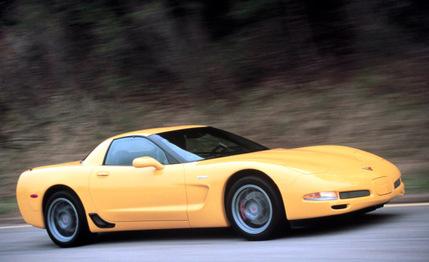 Road Test
Road Test
Stumble upon a nest of Corvette aficionados, and you'll hear more obscure alphanumeric sequences than if you'd crept into a meeting of the U.S. Joint Chiefs of Staff. Back in 1963, codes such as L-88, ZR-1, M-22, and ZL-1 were created as internal designations for Corvette options, but they have since taken on deep and emotional meaning for the Corvette faithful.
For 2001, Chevrolet will rejuvenate a code from this hallowed list with the new model you see on these pages. Called the Z06, it represents a variant of the C5 Corvette enhanced with a comprehensive package of go-fast upgrades designed to make it the highest-performance production Corvette ever built. (In 1963, the Z06 code signified a racing package that included finned aluminum drum brakes, a beefed-up suspension, and a 36.5-gallon gas tank.)
The new Z06 starts with a more powerful version of the Corvette's LS1 V-8 engine. Designated the LS6, this engine employs a redesigned intake manifold with smoother internal passages. Revised cylinder heads incorporate better-flowing intake and exhaust ports, combustion chambers redesigned to reduce valve shrouding, and a higher compression ratio. New thin-walled cast-iron exhaust manifolds provide a smoother exit for the combustion products.
To exploit the LS6's greater flow capacities at high rpm, the engineers fitted a hotter camshaft with more valve overlap and greater valve lift, new chrome-vanadium-steel valve springs, and stronger pistons cast from a more durable alloy. And to help air retreat from the underside of the flaying pistons, the LS6 has windows cast into the internal crankcase walls.
These collective changes result in 385 horsepower at 6000 rpm, 385 pound-feet of torque at 4800 rpm, and a redline of 6500 rpm increases of 40 horsepower, 35 pound-feet, and 500 rpm, respectively, over the current LS1 engine. Incidentally, by fitting a few of the LS6 pieces to the LS1 V-8, that engine gets bumped 5 horsepower and 25 pound-feet for 2001.
The LS6 engine feeds its fortified output to the rear wheels via a beefed-up clutch (with lighter pedal effort), a larger-diameter driveshaft, and a revised six-speed manual transaxle. Called the M12, this new gearbox has shorter gearing (10 to 16 percent shorter, except for fourth gear, which is unchanged) to better exploit the LS6 engine's higher-revving power band.
Collectively, these powertrain changes vastly increase the Z06's avail-able thrust and require major chassis revisions. As a result, the car gets a new FE4 suspension that includes revised shock calibrations all-around, a stiffer rear transverse leaf spring, and stiffer anti-roll bars front and rear (larger diameter with thicker walls).
There are also larger tires and wheels, with the rim width going up one inch at all four corners to 9.5 inches in front and 10.5 inches in back. Wrapped around these enlarged wheels, which also sport a new 10-spoke design and are said to be very light, is a new Goodyear tire called the Eagle F1 SC. It was developed specifically for the Z06. The fronts are 265/40ZR-17s; the rears are 295/35ZR-18s; each 20 millimeters wider than the rubber on other Corvettes.
These Eagle F1 SCs dispense with the run-flat capability of the standard C5 tires. Consequently, they have more flexible sidewalls, which permit a half-degree more negative camber (0.75 degree instead of 0.25 degree) to keep the tread flatter during hard cornering.
They also employ an asymmetric tread design with the inner tread biased toward wet grip and the outboard areas working best in the dry. In lieu of a spare, a can of high-tech — stop leak — and an inflation kit are supplied.
Finally, to make the most of the increased thrust and grip, Chevrolet engineers took a few things out of the Z06 — namely, 38 pounds. About 23 pounds comes from the new tires, thanks to the lack of run-flat reinforcements. Another six or so pounds comes from slightly thinner glass in the windshield and rear window. Finally, the Z06 gets a set of tita-nium mufflers (see sidebar), which are about 18 pounds lighter than the stainless silencers used on C5s. (Heavier drivetrain and suspension bits offset some of these reductions.)